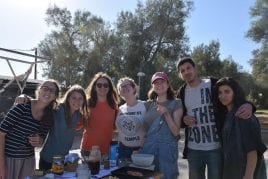
I just completed my second semester at the Arava Institute for Environmental Studies on Kibbutz Ketura. Putting my experience into a few words would be an impossible feat, and I won’t try to do it justice here, but I want to share a few reflections and lessons learned.
In short, the past year has been life-changing in every way. I am heartbroken to be leaving, but I know I leave a happier (hippier?) and more thoughtful being. I am lucky for the opportunity and eternally proud of myself that I was able to take a leap of faith in leaving school for a year to study in what is often called the middle of nowhere, with people whose paths I never would have crossed otherwise.
I echo Peace-Building Leadership Seminar (PLS) co-facilitator Sarah Benazera in saying that we have so much to learn from each other. I am a richer person because my Palestinian, Jordanian, Israeli, and international friends invited me into their inner worlds. Their stories – comedic, tragic, and everything in between – have shaped my world immeasurably and will continue to do so. And if our leaders listened to their voices more, our world would be a far better place.
I arrived in Israel with what seemed to be fully-formed ideas about the country, the conflict, and the region. I leave with more questions than answers, and some things I used to know for sure now seem dangerously naïve. But while I leave with questions and contradictions and personal biases, I do know that simple solutions often accompany complex problems. I won’t even begin to discuss simple solutions to simple problems such as our current climate crisis.
I have also come to understand in a far more comprehensive way the role the United States and Americans play in the Israeli-Palestinian conflict and the Middle East at large. We take up too much space. We take up too much space in discussions about the conflict, in policy decisions about the conflict, in bankrolling the conflict. Even when we are on the “right side”, our voices are too loud; inevitably muting those who are most affected by our words, votes, and dollars. Both the American Right and Left politicize, intellectualize, and therefore dehumanize Israel/Palestine for their own gain. I am beyond grateful that my voice was heard in our frequent discussions/arguments (during PLS and in more informal settings), yet I always felt like something was wrong when the voices most represented were American. We should talk less, listen more.
Another lesson I’ll share is that all of our acts are political (which is now more an echo of Environmental Policy lecturer Dr. Miri Lavi-Neeman). Where we travel and where we don’t, which pictures we choose to take and which not, which friends we gravitate towards, where we eat and how we label our food. What we pay for and why we pay for it at all. Our choices are made frequently as consumers, and therefore ripple globally, often with detrimental consequences. We choose to say which types of communities are possible, and write off the ones that do not align with our standards. Every day we should pause to look at the price tags on our belongings, the labels on our hummus containers, the languages we speak or do not speak, and ask why.
I thought about the balance of work and play often. To be at the Institute was to be juggling one extreme of political conflict and another extreme of hedonistic fiesta. I often felt guilty about partying when my very presence in a certain bar or club (such as in Ramallah or Jerusalem) was a political act. However, I think to realize our inability as individuals to be grave and intellectual all the time is an enlightened act. “Life is too important a thing to ever talk seriously about it,” as Oscar Wilde famously wrote.
Another lesson: nothing beats reclining in a hammock on a hot day, with a novel in one hand and an iced coffee in another, absurdly loud music in the distance, loving life despite its flaws.
I would love to write more about the beauty of desert, or the parties we had, or the amount of traveling I was able to do, but I’m not sure what purpose it would serve, aside from bragging, when the most important part of this year is whatever follows it. And as an alum I choose to spread the message of the Institute, rather than preserve it as some mythical moment in the expanse of my memory.
To my friends at the Institute, Kibbutz Ketura, and beyond – toda, shukran, I love you all.
submitted by Franny Gould

